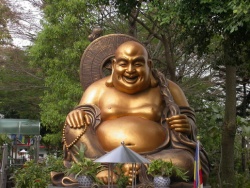Madhyamaka Lampoon
Those of us who take the words of the Buddha in his Tathagatagarbha sutras seriously and hold them in highest respect - that the Buddha is the eternal Self and that his immutable Essence is in all of us - are often told that we have failed to see that these doctrines are merely metaphorical ploys to attract certain types of fearful person into the Dharma. The doctrines do not mean what they say (so we are repeatedly told).
It is a worthwhile exercise to apply the same sophisticated techniques employed by this genus of critic to their own beliefs and claims.
In one of his works (Prasannapadaa), Chandrakirti (a famous expositor of Madhyamaka Buddhism), comments on how nihilists do not believe ultimately that things exist. He says of these nihilists that – some people argue – since for these nihilists:
“... things do not exist, the Maadhyamikas are the same as nihilists. We reply that this is not the case. Why? Because Maadhyamikas are proponents of dependent origination. Having apprehended causes and conditions, they explain that the entire present and future world is without inherent existence, because dependently originated. “
When Chandrakirti argues that Madhyamikas (followers of Madhyamaka Buddhism) are not the same as nihilists, this is not to be taken literally. These words are merely a skilful upaya [[[Wikipedia:tactic|tactic]] / ploy] to allay the fears of those who cannot face the stark truth that in actuality nothing has ultimate existence – the teaching of the nihilists. The reader should thus bear in mind throughout Chandrakirti’s assertions that everything he says is not what it seems to enunciate on a superficial, literal level - but is merely an upaya to help those not yet ready for the unvarnished truth of nihilism.
Equally, Chandrakirti’s claim that Madhyamikas “apprehend” causes and conditions needs to be deconstructed. What is “apprehension”? Is there any actual event or process called “apprehension” - can that ever be found? Does it have any meaningfulness at all? Do “causes and conditions” exist from their own side – or from any side at all - apart from that of sonics in empty air? And what are “proponents”? Is this not just a cipher for something that has no actual existence whatsoever? Still less can those mysterious things called “causes and conditions” be found and precisely profiled! These are just labels slapped onto a gaping void. Chandrakirti expects his intelligent reader to be alive to this. Thus when Chandrakirti says that the world (and what is a “world” – does that have any semantic sense to it at all?) is “dependently originated”, he really means that it is neither dependent nor originated - since no such phenomenon as “dependence” or “origination” has any ultimate meaning whatsoever, being devoid of verifiable reality: these are just fantasies being projected onto a non-existent, fantasy world.
Thus Chandrakirti is teaching – for those who do not get mired in the literal, overt levels of his text but who understand the “deep structure” of the metaphorics of his discourse - that Madhyamaka is actually the truth of nihilism and that it rejects even causes and conditions as anything meaningful or real. There is no “dependent origination”; there is no “Chandrakirti” who argues for it; and there is no “Madhyamaka” which proclaims it.
There is only Nothingness.
This is the glorious vision to which 2,500 years of Buddhist philosophy have brought us!
(And if, dear reader, you have not noticed my tongue lodged firmly in the side of my cheek throughout this - then you do indeed deserve to have no better philosophy to guide you through life than Prasangika Madhyamaka!)
